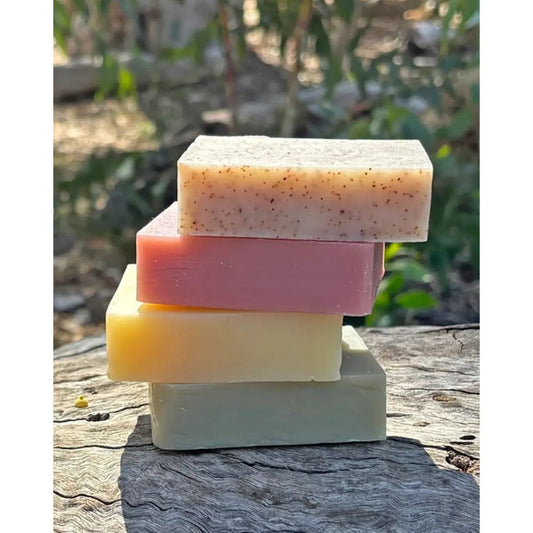
This is a disturbing tale of corporate deception, and the battle for environmental justice. We're talking about harmful PFAS chemicals that are now found in just about everything from your mascara to your takeaway pizza box and your waterproof jacket!
From non-stick pans to firefighting foams, corporations have been aware of the dangers while continuing to sneak PFAS our lives—and our bodies! In fact, PFAS chemicals can now be found in the bloodstream of 98 per cent of the world's population.
PFAS (per- and polyfluoroalkyl substances) are like the cockroaches of the chemical world: they’re practically indestructible. Created in the 1940s for their ability to resist grease, water, and heat, these chemicals seemed like the superheroes of modern industry. But as it turns out, they were more of a villain in disguise.
Here we answer all your questions about PFAS, which everyday products contain PFAS, and give you links to the PFAS free alternatives found at Biome.

The infamous legacy of PFAS
The scandal hit the fan when PFOA, a type of PFAS, leaked from a DuPont Teflon plant in the USA into the drinking water of communities in West Virginia and Ohio. But, that was just the tip of the iceberg. It was soon realised that PFOA and PFOS found in the fighting foam widely used by the military was harming local communities. And, we now know these chemicals are found in countless everyday items, and have found their way into the bodies of most people on earth! Yet, companies like DuPont, 3M, Bayer, Honeywell, Merck, have been tight-lipped about their exact uses and dangers.
Thanks to relentless investigators and some serious digging into patents and scientific reports, the full scale of PFAS use has come to light. And it's not a pretty picture. These chemicals are linked to serious health issues and refuse to break down in the environment, earning them the nickname “forever chemicals.” Find here the study by Juliane Glüge, a senior researcher at the Swiss Federal Institute of Technology in Zurich, who spent almost a year digging up details about the uses of PFAS.
A new documentary 'How to Poison a Planet' on Stan based on the work of Australian journalist Carrie Fellner and starring Mark Ruffalo, exposes the multibillion-dollar David and Goliath battle to hold the world’s largest chemical companies to account for decades of toxic contamination.
And in Junly 2024, Craig Reucassel aired this report on ABC Australia where he said:
They’re called forever chemicals and in Australia we usually associate them with the firefighting foam used on military bases.
But they’re also in many everyday products.
That’s because PFAS - poly-fluoro-alkyl and per-fluoro-alkyl - substances are very good at repelling oil, heat and water.
And they’ve been used so widely that researchers now find traces of them in the environment, in waterways and even in people.
Previous exposes include 'The Devil We Know Documentary' in 2018 available on Netflix, and 'The Forever Chemical Scandal' by Bloomberg Investigates.
Who's keeping an eye on the chemicals?
So, why are citizens like you and me left to play detective and clean up this mess? Big corporations, armed with their secrets and profits, have managed to dodge accountability, leaving communities to fend for themselves against these chemical invaders. They have known about the concerns for many years, but have to not moved quickly enough to stop using PFAS chemicals.
Why should we prove the safety of products when it should be the responsibility of those who made them? It’s like being handed a ticking time bomb and then being told to figure out how to defuse it.
This isn’t just about switching to PFAS-free shampoo. It’s about demanding transparency and safety tests from those at the top. Let’s turn our frustration into action, support local bans, advocate for stricter regulations, and hold manufacturers accountable.
Together, we can protect our health and our planet from these covert chemical culprits. Let’s make those who unleashed these chemicals take responsibility and ensure they clean up their own mess!
Frequently asked questions about PFAS
What are PFAS? PFAS stands for per- and polyfluoroalkyl substances. They are a group of over 4,000 synthetic chemicals known for their durability and resistance to various elements, earning them the nickname "forever chemicals"
Why are PFAS a concern? PFAS are persistent in the environment and the human body, meaning they don’t break down and can accumulate over time.
There is growing evidence to suggest that exposure to per- and polyfluoroalkyl substances (PFAS), commonly known as "forever chemicals," may increase the risk of certain types of cancer. Research has identified possible links between PFAS exposure and increased risks of thyroid cancer, testicular cancer, and some breast cancer subtypes.
Studies indicate that PFAS exposure is associated with a heightened risk of thyroid cancer, particularly related to certain types of PFAS like perfluorooctanesulfonic acid. The findings suggest that PFAS may be a contributing factor to the rising rates of thyroid cancer observed globally (The ASCO Post).
In addition, research involving U.S. Air Force servicemen has shown that elevated blood levels of PFAS, especially in individuals who served as firefighters or were stationed at bases with significant PFAS contamination in the water supply, were linked with an increased risk of testicular cancer (CancerEpiGen).
There's also evidence pointing towards a potential link between PFAS and breast cancer, particularly hormone receptor-positive subtypes in postmenopausal women. This connection is thought to stem from the endocrine-disrupting properties of PFAS, although the epidemiological evidence remains limited and not fully conclusive (CancerEpiGen).
Teflon is made using perfluorooctanoic acid (PFOA) and this has been linked to all sorts of problems including cancer and birth defects. PFOA accumulates in the environment, wildlife and in us.
When Teflon is heated above 360 degrees C it releases toxic gasses including PFOA. It takes a fry pan about 3.5 minutes to reach 360C. That strange smell coming from the pan is not a good thing.
Female employees of Dupont, the manufacturer of Teflon, were found to have abnormally high rates of birth defects. They sued Dupont for millions and won. Dupont were also fined over $16 million dollars for not declaring the environmental and health risk associated with PFOA by the Environmental Protection Agency.
While these studies indicate potential health risks associated with PFAS exposure, further research is needed to fully understand the scope and mechanisms of these effects. The existing evidence has led to calls for more stringent regulation and efforts to reduce PFAS exposure in the population.
How are people exposed to PFAS? Exposure can occur through contaminated water, food, products, and dust that contain these chemicals. PFAS can be ingested, inhaled, or absorbed through the skin.
Are there PFAS-free alternatives? Yes, there are alternatives to PFAS-containing products.
Everyday items with PFAS
Many of the items in this list are thanks to the 2020 study "An overview of the uses of per- and polyfluoroalkyl substances (PFAS)" that found hundreds of products containing PFAS.
Of course, we have done the research for you, so every product you find at Biome is free from PFAS. Shop with peace of mind knowing that every product is a PFAS-free alternative.
Click on the links to go straight to the PFAS free alternatives at Biome!
| Non-stick cookware, such as Teflon. |
| Water-resistant clothing, raincoats, breathable membranes, athletic wear, outdoor gear, tents |
| Shoes |
| Swimwear |
| Stain-resistant carpets |
| School uniforms |
| Food packaging |
| Mascara, eye shadow, eye and brow pencil, long lasting lipstick, foundation, concealer, blush, lip liner, powder, lip balm, |
| Body lotion, body oil, eye cream, makeup remover, anti-aging cream, moisturiser, skin scrub |
| Nail polish, nail strengthener, cuticle treatment |
| Bars of soap |
| Bandaids / adhesive bandages |
| Sunscreen |
| Deodorant |
| Shampoo & conditioner, hair creams, conditioners, anti-frizz cream, hair spray and mousse |
| Shaving cream |
| Toilet paper |
| Menstrual products |
| Toothpaste |
| Dentai floss |
| Contact lenses |
| Hair curling wands & straightening irons |
| Ironing board covers |
| Irons |
| Baking paper |
| Stain / water repellent sprays like Scotchgard |
| Microwave popcorn bags |
| Pizza boxes |
| Guitar strings |
| Consumable pharmaceuticals: capsules |
| Lubricants - for pianos during tuning, brake fluid, |
| Filters used in wineries to strain wine before bottling |
| Water filters |
| Glass treatment to make it resistant to fingerprints |
| Propellant |
| Paints and varnishes |
| Razors |
| Liquid Crystal Displays (LCDs) |
| Laminated floor coverings |
| Gloves, surgical gowns |
| Huge number of medical uses |
| Manufacturing leather and synthetic leather |
| X ray film |
| Manufacturing paper |
| Printer ink |
| Pesticides such as cockroach sprays |
| Surfboard and ski wax |
| Climbing ropes, tennis rackets, golf gloves |
| Production of plastic and rubber |
| Sparkling water |
How to avoid PFAS in products?
By being aware of where PFAS can lurk and making informed choices, individuals can significantly reduce their exposure to these chemicals, and support a healthier environment.
These chemicals are often used in personal care products for their ability to repel water and oil, creating a smoother texture and longer-lasting effect.
However, due to health concerns associated with PFAS, many consumers and manufacturers are seeking alternatives.
Individuals can take several steps to reduce their exposure to PFAS:
1. Check your water: If you’re concerned about PFAS in your drinking water, contact your local water utility to find out if they’ve tested for PFAS. Consider installing a water filter certified to reduce PFAS levels.
2. Choose safe cookware: Avoid non-stick cookware that may contain PFAS. Opt for safer alternatives like cast iron, stainless steel, or ceramic pots and pans.
3. Be mindful of food packaging: Reduce the use of take-out containers and other food packaging that may be treated with PFAS. Instead, use fresh foods and store them in PFAS-free containers.
4. Personal care products:
- Read labels carefully: look for ingredients with “fluoro” in the name, such as polytetrafluoroethylene or DEA-C8-18 perfluoroalkylethyl phosphate, which indicate the presence of PFAS
- Shop from brands that have PFAS-free policies in place or are certified by environmental health organisations
- Many companies are now declaring that their products have no added PFAS. These brands are often listed in registries by Green Science Policy Institute, ChemSec, and Cradle to Cradle Certified

5. Avoid Stain-Resistant Products: Steer clear of products labeled as “waterproof,” “water-resistant,” or “stain-resistant,” as they may contain PFAS. This includes clothing, furniture, and carpets.
MORE READING






















